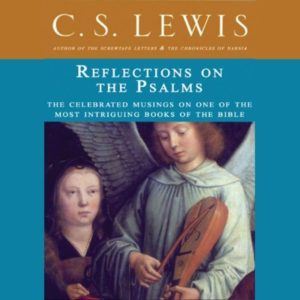The sacred vs the secular; the substance vs. the external; the spiritual vs. the ritual. We deal with this tension all our lives. I question whether anything is truly secular. After all, the world and everything in it comes from the hand of God. What makes it secular is when we remove Him from his creation.
We focus a lot on externals and rituals, sometimes allowing them to substitute for the truly substantive and spiritual. When we do that, even though we may keep the form of godliness, we deny its essence.
I’ve never been one for promoting outward forms of our most sacred holidays. We taught our children from the start that Santa Claus wasn’t real; we never talked about an Easter bunny or emphasized the Easter basket. While I’m not trying to sound like a curmudgeon, I have always wanted to make sure we focus on the real—cliché warning–reason for the season.
 C. S. Lewis, in his Reflections on the Psalms, uses the example of Easter to make the point I believe I’m trying to make.
C. S. Lewis, in his Reflections on the Psalms, uses the example of Easter to make the point I believe I’m trying to make.
There is a stage in a child’s life at which it cannot separate the religious from the merely festal character of Christmas or Easter.
I have been told of a very small and very devout boy who was heard murmuring to himself on Easter morning a poem of his own composition which began “Chocolate eggs and Jesus risen.”
This seems to me, for his age, both admirable poetry and admirable piety.
When I was a small and not very devout boy, Easter was all eggs and candy. Jesus, at first, wasn’t even a passing thought. Perhaps that’s why I react so strongly today against all the outward trappings that hide the significance of Resurrection Day.
 Yet for the very devout boy in Lewis’s story, his development spiritually is going to be different than mine. Lewis continues,
Yet for the very devout boy in Lewis’s story, his development spiritually is going to be different than mine. Lewis continues,
But of course the time will soon come when such a child can no longer effortlessly and spontaneously enjoy that unity. He will become able to distinguish the spiritual from the ritual and festal aspects of Easter; chocolate eggs will no longer be sacramental.
When that stage of development is reached, it will be decision time:
And once he has distinguished he must put one or the other first. If he puts the spiritual first he can still taste something of Easter in the chocolate eggs; if he puts the eggs first they will soon be no more than any other sweetmeat.
They have taken on an independent, and therefore a soon withering, life.
Whenever we give priority to the secular, the external, and the ritual, we lose the meaning of the event entirely. The same is true of our lives. We waste our lives when we banish the sacred, the substantive, and the spiritual. We become our own little wasteland.
What we need to realize is that even if we retain some of the spiritual, any subordination of the spiritual is just as bad as banishment. For all practical purposes, relegating God to second place is no different than pushing Him away altogether.
In Him we live and move and have our being. Anything less is an independent and soon-withering life.
